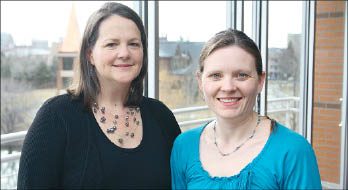
Home » Gonzaga professors develop stress relief for women
Gonzaga professors develop stress relief for women
Three-step plan averts burnout, aims to turn adversaries into allies

March 29, 2012
Gonzaga University School of Business Administration faculty members Molly Pepper and Peggy Sue Loroz have developed a program that shares experiences and techniques they've developed to help women reduce unhealthy stress in the workplace.
Pepper, assistant professor of management, teaches classes in human resource management, ethics in human resources, and developing people and organizations. Loroz, associate professor of marketing, teaches classes on consumer behavior, persuasion, and marketing ethics.
They've broken stress management into a proactive, three -step approach that involves establishing boundaries around productive time, focusing on a "mighty purpose" for each role that they fill, and creating or joining an affinity group.
Stressors that women commonly face above and beyond normal workday stress include impediments to advancement, work-life balance, and bullying, they say.
When stress is constant or continuous, it leads to burnout, Pepper says. Symptoms of burnout include exhaustion, a feeling of cynicism, disengagement, and a sense of ineffectiveness.
That can lead to increased absenteeism, reduced productivity, and turnover, all of which is expensive to an employer and could have unhealthy consequences for an employee, she says.
Job burnout also has been identified as a contributor to clinical depression, and a recent health study links burnout to emotional eating in women. As people seek to cope with stress to overcome burnout, they tend to sacrifice their health and try to work through it, Pepper says.
"They stop exercising or eating correctly, and that adds to stress," she says.
Women are no less susceptible than men to heart and blood pressure problems to which workplace stress can contribute, Pepper says.
One way to reduce burnout in the workplace is to be protective of productive time by guarding against unnecessary interruptions and inefficient uses of it.
Pepper and Loroz subscribe to the Pareto principle when it comes to productive time. The Pareto principle, also known as the 80-20 rule in various economic applications, was first described by Italian economist Vilfredo Pareto, who noted that in many situations, 80 percent of effects come from 20 percent of the causes.
In line with that principle, Pepper says 80 percent of her productivity occurs during 20 percent of her work day.
For her, that's early in the morning, so she takes care not to use that time doing nonproductive tasks.
Pepper and Loroz promote introspective exercises that help women discover how they wish to make an optimal positive difference, or find their mighty purpose, in each role that they fill.
"Reflection and meditation on that helps discern what that is to you," Loroz says. "When you know your mighty purpose, concentrate on that, and don't spend so much time on things not so critical to it."
In her role as a college instructor, Loroz says the mighty purpose concept helps her stay focused on the core of what she's trying to do.
"I'm helping students understand people better so they can contribute to the common good," she says.
Loroz and Pepper both are mothers and wives and have separate mighty purposes in those roles.
"We're well acquainted with difficulties of trying to maintain balance and not get overwhelmed by stress and burnout," Pepper says.
Women shouldn't be expected to change their identities at work.
"The mighty purpose exercise is a great way for women to reassure themselves of who they are and what they came for and not to be what they're not."
One major thing some women should change, though, is how they view other women in the workplace.
Some of the worst bullies in offices can be women, and they tend to bully other women, Loroz says. That's partly because women tend too often to see each other as competitors, she says.
Loroz and Pepper recommend forming or joining workplace affinity groups for women with the goal of becoming allies rather than competitors.
The groups should be inclusive—that is, open to anyone who wants to join—but their goals should be focused on supporting women in their respective workplaces, Loroz says.
"Affinity groups help lessen psychological stressors," she says.
They also can be the basis for mentoring programs. Such groups have been successful in helping women break the glass ceiling, an invisible upper limit in the ranks of businesses or organizations above which women find it difficult to rise, Pepper says.
"When a woman does break through, she's already connected with other women she can help along," Loroz says.
The affinity group should meet often enough that women members feel daily support in their jobs, Loroz says.
"It has to be local and tangible," she says.
At Gonzaga, Loroz and Pepper are active in the Women of Jepson affinity group, which primarily supports women in the university's School of Business Administration.
Loroz has been at Gonzaga for 12 years and Pepper for nine years. They came together as Loroz became active in Women of Jepson.
After sharing their stress-management strategies with each other over a number of years, Loroz and Pepper developed a presentation which they first delivered at the National Association for Women in Catholic Higher Education annual conference last year in Seattle.
They revamped the program and presented it for the first time on the Gonzaga campus earlier this week.
Latest News
Related Articles




